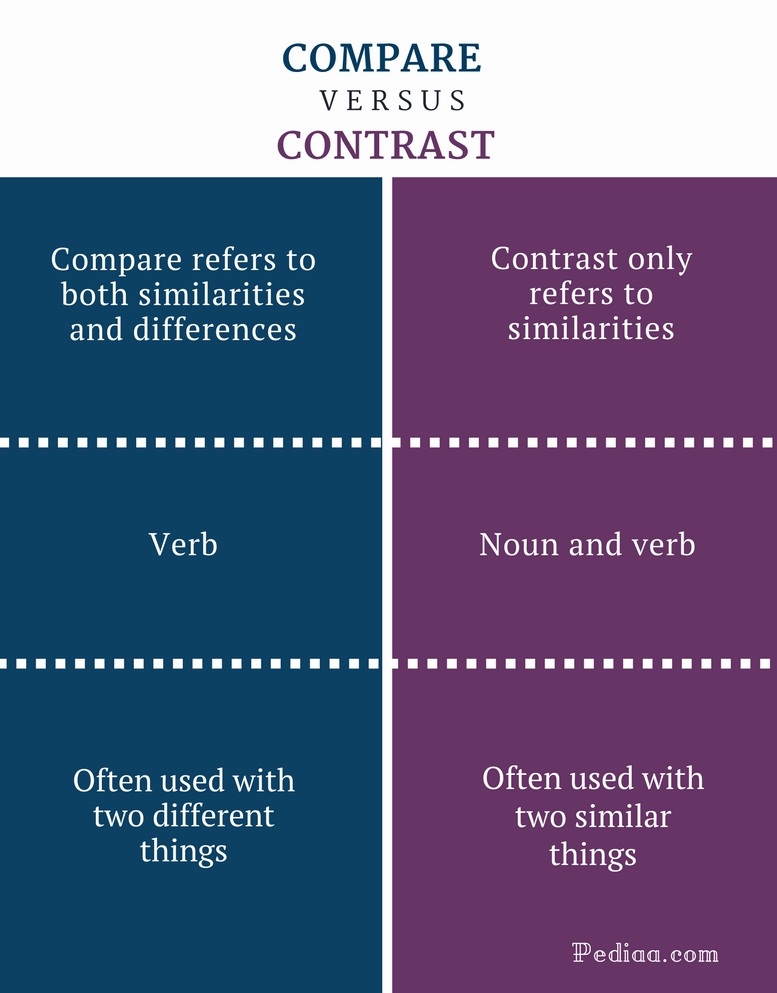One of the most common is the comparison/contrast essay, in which you focus on the ways in which certain things or ideas—usually two of them—are similar to (this is the comparison) and/or different from (this is the contrast) one another Jan 05, · Definition of Comparing and Contrasting Comparing and contrasting are ways of exploring the similarities and differences between two things. 'Compare and contrast' is often used as a development Jan 09, · The word compare is derived from the Latin ‘comparare’ whereas the word contrast is derived from the Latin ‘contrastare’. You use the word compare when you have the intention of representing or describing the similarities between two objects. You can also use compare when you want to make a comparison between two objects
Compare And Contrast | Definition of Compare And Contrast by Merriam-Webster
While language helps us to get clarity on a particular subject, it can prove to be equally confusing at times. Two such words adding to the vocabulary of the English language are: Compare and Contrast, comparison contrast meaning.
We are here weighing the consequences of both these objects or situations carrying similarities in them which may or may not be visible. For example, if you compare a person living in India with someone living in Bangladesh, you are here deducing the coincidences of similarity.
You are considering the characteristics of both these people and forming an opinion or coming to a desirable conclusion. This weighing of characteristics of two different situations or objects can be called comparing. Contrast basically underlines the characteristic s which segregates the situations or objects. There are times we incur a situation where we are expected to analyse two different objects or circumstances and weigh their respective characteristics to come to a conclusion.
Suppose a person wants to go on a vacation and is confused between Shimla and Darjeeling. Both places are cold but Shimla is colder, comparison contrast meaning. Both places have marvellous hills but the mountains in Shimla are steeper and so on and so forth. In comparison contrast meaning manner, you compare or weigh the essentialities of two different or almost similar situations or things.
You introspect and deduce your personal analogies of a given comparison contrast meaning. This act of introspecting situations can be called comparing. So now we understand the clear difference between compare and contrast. While compare corresponds to calculating the similarities in a given situation, contrast digs for the differences in the same.
Other than inferring the differences in their meaning, one struggles to find any differences between the two, comparison contrast meaning. To view this video please enable JavaScript, and consider upgrading to a web browser that comparison contrast meaning HTML5 video. Skip to content While language helps us to get clarity on a particular subject, it can prove to be equally confusing at times. Comparison Table Between Compare and Contrast.
Test your knowledge level. Comparison contrast meaning of Contents.
Compare and contrast essay structure
, time: 5:25Comparison and Contrast – Writing for Success

The difference between Compare and Contrast is that while we draw similarities when we “compare” two objects, we draw differences when we “contrast” the same. When we use the word “compare” in a sentence, we basically mean that we are drawing similarities between two different objects or situations Jan 09, · The word compare is derived from the Latin ‘comparare’ whereas the word contrast is derived from the Latin ‘contrastare’. You use the word compare when you have the intention of representing or describing the similarities between two objects. You can also use compare when you want to make a comparison between two objects One of the most common is the comparison/contrast essay, in which you focus on the ways in which certain things or ideas—usually two of them—are similar to (this is the comparison) and/or different from (this is the contrast) one another
No comments:
Post a Comment